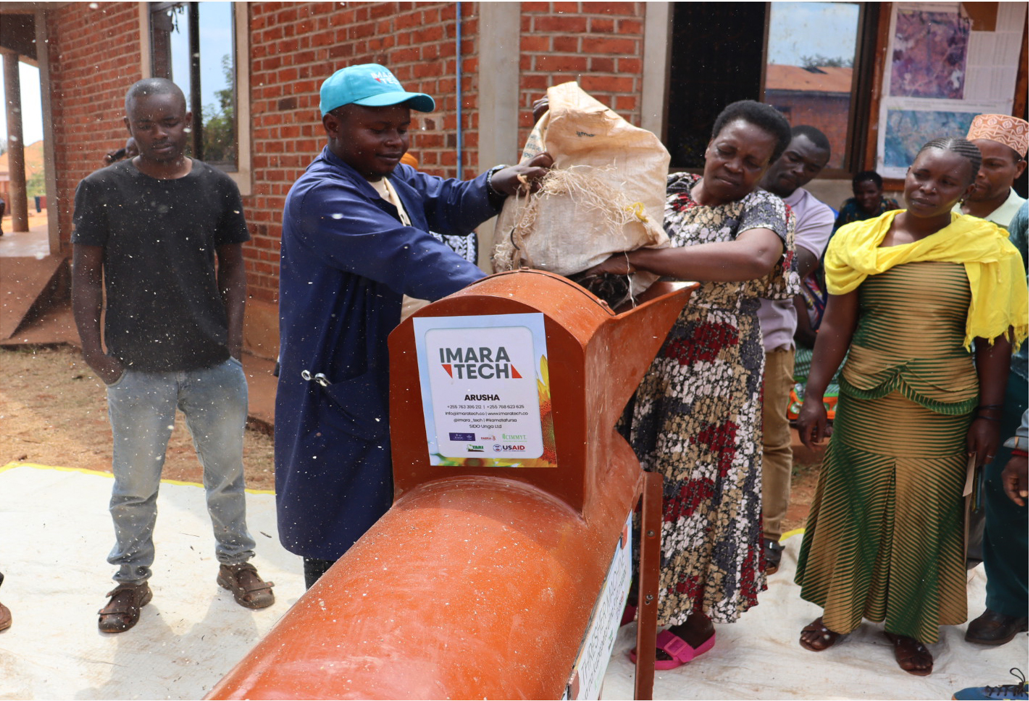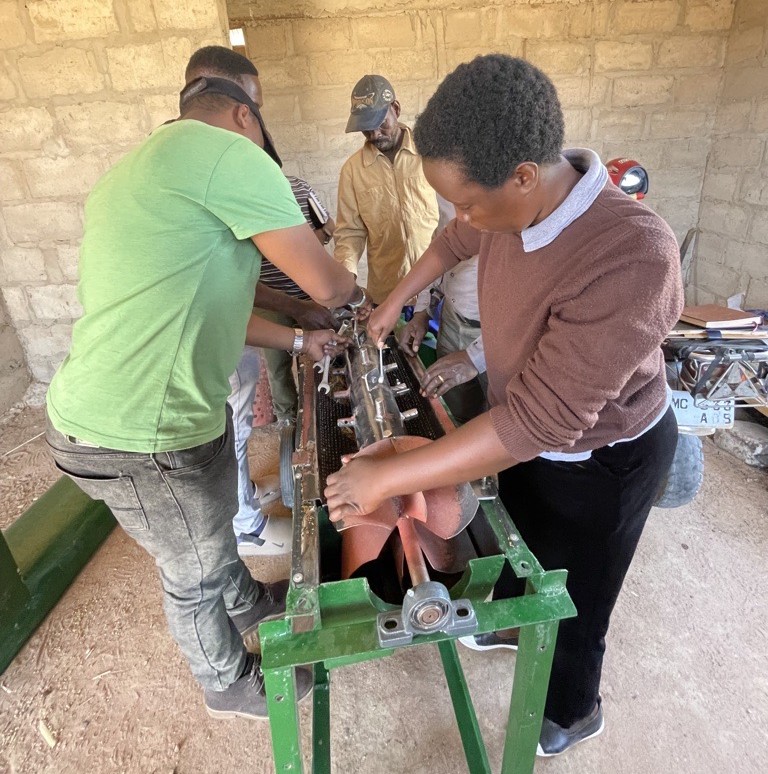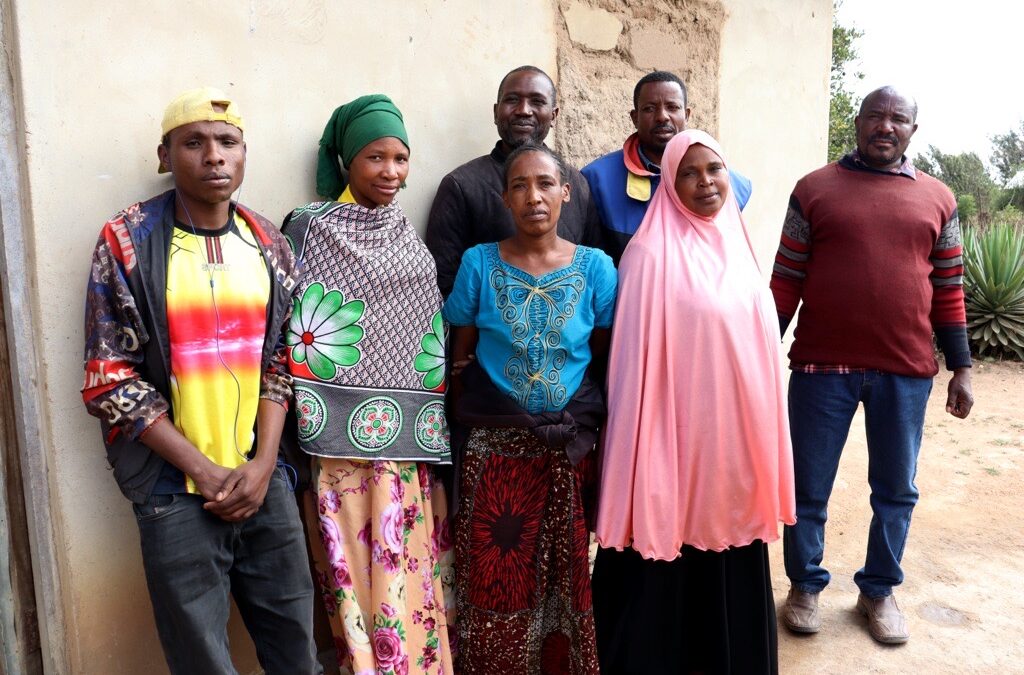By Martin Majambele, Radegunda Kessy, Atupokile Mwakatwila and Justus Ochieng
In Tanzania, a silent revolution is taking place in the fields, where women and youth farmers are leading the charge. With the introduction of Multi-Crop Threshing Machines (MCTs), a transformative shift is reducing the labour burden, increasing incomes, and creating new opportunities for empowerment. The Multi-Crop Thresher Machines (MCTs) Initiative, funded by the United States Agency for International Development (USAID) and implemented by the Alliance of Bioversity International and CIAT through Pan-Africa Bean Research Alliance (PABRA-Africa) in collaboration with Imara Tech and partners like Farm Africa, the Agricultural Markets Development Trust (AMDT), Rikolto, the Center for Behaviour Change Communication (CBCC), Nafaka Kilimo, and Kibaigwa Flour Supplies (KFS), is making significant strides in increasing incomes, creating jobs, and reducing the workload for these groups.
The project empowers women and youth by providing multi-crop threshing machines capable of threshing, shelling, and winnowing nine different crops, including maize, sunflower, sorghum, millet, finger millet, green grams, pigeon peas, lablab, and beans. To make these machines accessible and affordable, the project covers 50% of the cost, enabling women and youth to benefit from this labour-saving technology.

Picture 1: Demonstrations on how to operate the Multi-Crop Thresher for easier, faster crop processing. Alliance-Bioversity & CIAT
Successful Launch and subsequent impacts
As the MCTs rolled out across Singida, their impact became clear—not just in the numbers but in the stories of farmers like those in the Wema and Tunaweza Vijana Groups, whose communities have transformed.
In early August 2024, the project celebrated a significant milestone with the rollout of 45 multi-crop threshing machines in the Singida region. This launch followed an extensive sensitization campaign that highlighted the machines’ efficiency, especially for women and youth, who typically shoulder the brunt of labour in agricultural activities.
Later, follow-up visits were conducted in five districts – Singida DC, Iramba, Manyoni, Ikungi, and Mkalama, aimed at gathering feedback from local farmers on the performance of the machines and their effects on productivity. Early reports suggest that the machines have significantly reduced labour time and increased crop yields, thereby enhancing the incomes of participating households.
Onyesha Ushirikiano: Transforming Agriculture Through Community Collaboration
In the serene village of Kidii, within the Msingi Ward, Mkalama District, the Onyesha Ushirikiano (Showing Cooperation) group has emerged as a model of community collaboration and agricultural success. This cooperative, made up of 40 farmers, both men and women, has demonstrated the power of working together to create opportunities for economic growth, social empowerment, and agricultural improvement.
In the 2024 farming season, the group embarked on providing threshing services to local farmers, which quickly became a vital service in the community. Over the course of the season, they threshed 305 bags of maize, 27.5 bags of sorghum, and 6 bags of pearl millet. The group charged between TZS 1,000 and 1,500 per bag (US 0.4-0.6), depending on the type of crop, and in total, they generated TZS 355,250 (US$ 142) in revenue in one month. This represents about 33 percent of the capital invested by the group to acquire subsidized threshing machine from PABRA/ This income has been reinvested into the group’s activities, providing resources for future growth and improvement.
“We’re now looking for ways to make even better use of all the resources we have,” said Neema Leonardo Hussein, a member of the group. “The threshing machine has transformed the way we work, it’s not just about processing crops; it’s about coming together as a community, supporting one another, and making our farming practices more efficient.”

Picture 2: Onyesha Ushirikiano members, living their name, as they work together to grow stronger and reap the benefits of unity. Photo Credit: Imara Tech
Wema Group: A Model of Unity and Shared Success in Community Collaboration
In the village of Mhamo, the Wema Group, consisting of 41 members (30 women and 11 men), received their multi-crop thresher machine in July 2024.
“We have threshed over 130 bags of maize for more than 45 farmers, charging between 1,200 and 1,500 Tanzanian shillings per bag. This success has not only generated income for the group but has also provided essential agricultural services to the wider community”, said Rebecca Elia Nkwae, member of Wema Group.
Expanding their operations, they have begun using the machine to thresh sunflower crops in a neighbouring village, further enhancing their reputation and impact across the region.
“Since receiving the machine, we’ve witnessed how teamwork can transform our farming practices and strengthen our community. The machine has been a game-changer for us. It’s not just about threshing crops; it’s about coming together to support one another and grow as a community,” said Rajab Athuman, Vice Chairperson of the Wema Group.
Tunaweza Vijana Group: Youth Empowerment in Action
With 30 members, including 16 women, the group rents out the machine for TZS 1,000 (US$ 0.4) per bag of maize, processing around 120 bags and serving over 50 farmers. This initiative has generated TZS 120,000 in revenue, which they are saving for future investments.
Before acquiring the MCT, the group relied on smaller, less efficient threshing machines that were scarce in the region. The MCT has significantly improved their operations by enhancing crop cleaning during threshing and increasing overall farming efficiency. Inspired by the success of the MCT project, they are now exploring further opportunities, such as converting maize cobs removed during threshing into animal feed. They are currently saving to purchase a machine from Imara Tech that will grind these cobs into a finer, more digestible form suitable for livestock.

Picture 4: Members of Tunaweza Vijana Group, standing with the group MCT Machine, Iramba District. Alliance-Bioversity & CIAT
Furaha Group: Diversifying for Resilience
Apart from Tunaweza Vijana and Wema groups, the Iguguno village-based Furaha Group, established in 2016, has also effectively embraced the MCTs, efficiently threshing over 100 bags of maize for more than 40 farmers in two weeks after recieving the support. Despite receiving the machine late when the harvesting season had ended, they generated over TZS 100,000 (US$ 38) which supported various ventures, including groups’ liquid soap processing. The group are optimistic that they will recover the total cost of the machine next season.
Thanks to the financial boost from the MCT, Furaha Group is planning to expand their agricultural efforts to cultivate a diverse range of crops, such as sunflower, pigeon peas, millet, and chickpeas across their 72 acres of land. This diversified approach not only strengthens their resilience but also showcases the transformative impact of the MCT on their community and entrepreneurial activities.

Picture 5: Representatives of Furaha Group, Mkalama District.
Photo Credit: Alliance-Bioversity & CIAT
Overcoming Challenges
Despite notable successes, the journey has not been without its obstacles. Challenges in machine maintenance have provided valuable lessons that underscore the need for continuous technical support. For example, the Ikumese A Group in Ughandi Ward experienced issues after failing to thoroughly check their crops, which resulted in stones damaging the machine. Additionally, some farmers struggled to reassemble the machines correctly after cleaning, which hampered overall efficiency.

Picture 6: Rocks and stones found within the MCT pose a significant problem, impacting machinery performance and efficiency. Photo credit: Alliance-Bioversity & CIAT

Picture 7: Side profile of rocks found within the MCT, highlighting the challenges they present for machinery and operations. Alliance-Bioversity & CIAT
Another common challenge is that many farmers struggle to reassemble the machines correctly after cleaning or repairs. This highlights the importance of training in proper machine handling, to prevent downtime and inefficiencies. For instance, some farmers have mistakenly installed the grinders in opposite directions, which significantly hampers the MCT’s effectiveness. This issue highlights the need for additional training on proper handling and maintenance to prevent unnecessary downtime and inefficiencies.

Picture 8: Illustrating the incorrect arrangement of the grinders, a key issue affecting machine efficiency and performance. Photo credit: Alliance-Bioversity & CIAT
Addressing Setbacks
To address these setbacks, ongoing training programs are essential. Farmers require technical training focused on proper machine operation, crop preparation, and maintenance. Rahim Amir, Technical Manager of Imara Tech, adds: “By equipping farmers with the skills for proper machine operation and maintenance, we can minimize downtime and maximize productivity.”
These challenges will be addressed by creating training materials such as visual instructions, videos, and manuals to guide users in operating and assembling the machines and shared with the beneficiaries through their WhatsApp. These tools will empower farmers to take ownership of the machines, improving their confidence and capabilities.
By prioritizing timely support and improved training, the MCT project can continue to empower women and youth, fostering sustainable income opportunities and alleviating the labour burden in Tanzanian agriculture. This initiative exemplifies the potential of collaborative efforts to transform lives and communities.

Picture 9: The Imara Tech team collaborates with the Dung’unyi Ward Extension Officer, Ikungi district (right) to address and correct the situation. Photo credit: Alliance-Bioversity & CIAT


